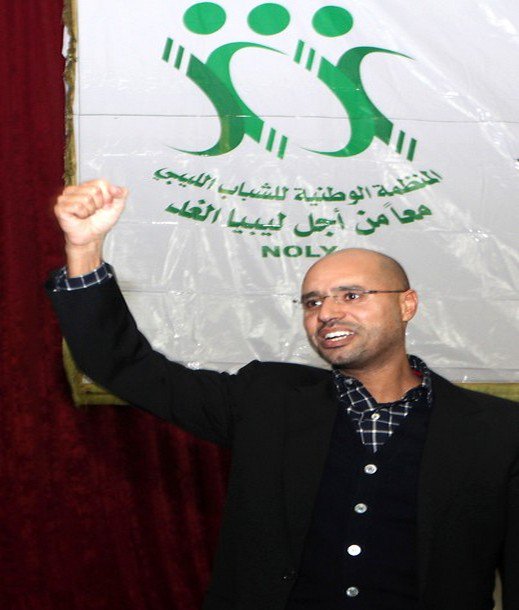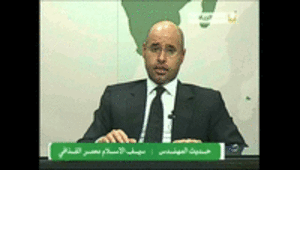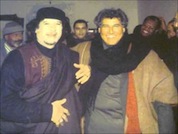UN has set dangerous precedent, says Libya's oil boss
منتديات زنقتنا-منتديات شباب ليبيا الأحرار :: المنتديات السياسية :: الأخبار باللغة الانجليزية News in English
صفحة 1 من اصل 1
 UN has set dangerous precedent, says Libya's oil boss
UN has set dangerous precedent, says Libya's oil boss
The head of Libya’s national oil company has lashed out at the United Nations, suggesting the head of the international organisation’s mission to his country, Martin Kobler, had set a dangerous precedent by seeking a deal with one of the militias blocking Libya’s oil ports.
Mustafa Sanalla, the head of the Libyan National Oil Corporation, said the UN’s reputation had been tarnished by Kobler’s meeting with the so-called Petroleum Facilities Guard, a group that has kept the country’s ports closed for nearly three years.
The Libyan press reported that the militia’s leader, Ibrahim Jodran, had been offered millions of dinars by the UN-backed government to resume oil exportations – which Sanalla described as a bribe.
Sanalla, a politically neutral technocrat, was highly critical of Kobler’s decision to meet the militiaman, who he said had been responsible for the loss of $100bn (£77.1bn) in revenue which has brought the once prosperous country to its knees.
“[Kobler] goes to speak to this man and regards him like a hero,” Sanalla said. “This is a big mistake. He is listening to the criminal and not the victims. If he is paying money to this man, it is an even bigger mistake because they are rewarding him, since it will encourage others to try blackmail. It is a very dangerous precedent. It will encourage others to do the same.”
Jodran agreed at the end of January to reopen the oil terminals after his meeting with Kobler, who was the mediator of the deal.
Despite its official-sounding title, the Petroleum Facilities Guard (PFG) is seen by the head of the oil corporation as little more than a militia and extortion racket. The PFG had been demanding back payments in return for reopening the three oil terminals under his control.
“Jodran has been responsible overall for the loss of $100bn in revenue so he has been responsible for almost all the problems in the country – the devaluation of the dinar’s value, the 400% inflation, the lack of food, the long queues in front of the banks, the lack of medicine in the hospitals,” said Sanalla.
“Libyans rely on oil. It represents 98% of the revenue of the government, and this man holds the country hostage for three years so he and his allies can control the National Oil Corporation. He is a curse on the country
“I am not a politician, nor a diplomat, I am an engineer, but I have told Kobler [he has] have contaminated the name of the UN inside Libya.”
Despite being assured that the deal did not include any improper payments, Sanalla said the precise details needed to be published. “If there was a deal, all the payments should be transparent and under the control of the legitimate monitoring bodies in the Libyan state,” he said. “Oil terminals must be reopened without any payoff and only through official channels.”
The controversy shows that, although the recent focus in Libya has been on the US-backed liberation of Sirte from Islamic State control, the political battle to reunite the divided country and revive oil production, the lifeblood of the Libyan economy, remains critical.
The country is dogged by rivalry between the UN-backed government in Tripoli and its rival in the east – as well as numerous other militia and tribal rivalries. “There are factions that block oil production in the oil fields, vandals that threaten to destroy or metre the flow of oil through valves along the pipelines, and militia that blockade the oil ports of the Libyan crescent,” Sanalla said.
He said he was working with all the groups to try to end the blockades but that required a wider political agreement about how the revenues will be distributed.
Before the country descended into chaos, Libya was producing 1.6m barrels a day and Sanalla had planned to produce 2.1m barrels a day by 2017. Storage capacity at the ports should be 6m barrels but violence has seen that figure fall to only 750,000.
The oil chief’s revived plans, dependent on the restoration of security, the reopening of closed oil fields in the west and government investment, could see production rise from 216,000 barrels per day (bpd) to 500,000 per day by the end of the month and then 900,000 by the end of the year.
Without a minimum of 800,000 bpd, Libya is unlikely to be able to pay salaries, invest in much-needed infrastructure or maintain its economy.
Sanalla warned that the apparent fall of Sirte may mean displaced Islamic State forces would seek to sabotage thinly guarded oil installations in the rest of the country. “We do not know where they will go but they have attacked the oil fields before. It is a concern.”
He is equally concerned that the PFG and their Libyan National Army rivals may fight for control of the Zueitina oil terminal, one of the three central ports controlled by the PFG. “There are 4m barrels in that area and, if there is a fire in that area, there will be a disaster. I am urging everyone to keep the area safe.” Six western governments issued a statement on Wednesday urging all sides to avoid a battle for the terminal.
For the longer term, Sanalla is working on a range of security plans for the oil fields, including one in which an inner circle is protected by a force run by the private oil companies and the outer circle controlled by a revamped PFG. Another option is to use a revamped army, but that requires a political reconciliation so a single government can operate.
“My frustration is that this country can be, and was, so wealthy. The country has descended into poverty and we cannot send money to the treasury. The deficit last year was 40bn dinars – all because of the oil blockade designed to support one militia or another.”
https://www.theguardian.com/world/2016/aug/11/un-dangerous-precedent-libyas-oil-boss--militias
ـــــــ-ــــــ-ـــــ-ـــــ-ــــــ-ـــــــ-ـــــ-ــــ-ــــــ-ــــــ-ـــــــ-ـــــــ-ـــــــ-
التوقيع


ليبيا خضراء غصباً عن الكل

brokenpen82-

- الجنس :

عدد المساهمات : 5045
نقاط : 16630
تاريخ التسجيل : 08/04/2011
. :
. :
 مواضيع مماثلة
مواضيع مماثلة» En Tunisie, l’Etat islamique lance une attaque sans précédent à la frontière libyenne
» This is the end of the old shumta Hillary clinton,she is fired by her own boss
» Tripoli, a Tense and Listless City With Gunmen and a Well-Stocked Boss Outlet
» This is the end of the old shumta Hillary clinton,she is fired by her own boss
» Tripoli, a Tense and Listless City With Gunmen and a Well-Stocked Boss Outlet
منتديات زنقتنا-منتديات شباب ليبيا الأحرار :: المنتديات السياسية :: الأخبار باللغة الانجليزية News in English
صفحة 1 من اصل 1
صلاحيات هذا المنتدى:
لاتستطيع الرد على المواضيع في هذا المنتدى






» أحلاس الصّهينة
» النفير المقدس
» الى شيوخ ومثقفي الخليج
» .سجل حضورك ... بصورة تعز عليك ... للبطل الشهيد القائد معمر القذافي
» أملٌ زمنَ القهر
» أملٌ زمنَ القهر
» عملاق الردى
» إجرام الغرب
» فضبدة الخذلان
» شرف المقاومة
» زمرة العز في زمن الهوان
» دليل التّردِّي
» الخذلان المذل
» أحرارُ الخَلَف
» وثبة الابطال في اليمن
» هان العرب
» الى ابي عبيدة
» الى ابي عبيدة
» شعب الاباء في غزة